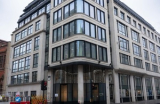
The Foreign Secretary has announced a new package of support for Palestinian refugees in the Middle East.
On a visit to Jalazone Refugee Camp in the West Bank, the Foreign Secretary announced a funding boost of £10 million to UNRWA, the UN body which supports 5.9 million refugees in Gaza, the West Bank, Jordan, Lebanon and Syria.
The additional funding will respond to the deepening crisis for Palestinian refugees. The UK’s increased annual contribution to UNRWA will support the agency to continue providing education to around 543,000 children a year - half of them girls - and deliver health services to 1.9 million Palestinian refugees in the region. 5.9 million registered Palestinian refugees are covered by the agency’s mandate.
Foreign Secretary James Cleverly said:
On my visit to Jalazone refugee camp today, I have seen first-hand the impact of UNRWA’s work supporting Palestinian refugees in the West Bank.
UK funding is helping to support 5.9 million Palestinian refugees across the region with vital healthcare and education services, and today I’ve announced a further increase to our contribution.
UNRWA is in dire need of additional support to continue its work, so I urge the international community to step up support.
The Foreign Secretary met with UNRWA Commissioner-General Philippe Lazzarini during the visit and heard about the financial crisis facing UNRWA. He discussed the important services that UNRWA are delivering in the face of increasing violence and fragility. He also met with students from the UNRWA school in Jalazone Refugee Camp.
Escalations in violence have put increased pressure on Palestinians and UNRWA’s essential services. UNRWA is a lifeline for millions of Palestinian refugees in the West Bank, Gaza, Jordan, Lebanon and Syria.
Further information
-UNRWA was created in 1949 with a temporary mandate to provide essential services to Palestinian refugees.
-The Palestinian refugee population that UNRWA supports has grown from 700,000 in 1948 to 5.9 million today, spread across Gaza, the West Bank, Jordan, Lebanon and Syria. Photo by Chris Eason, Wikimedia commons.









































